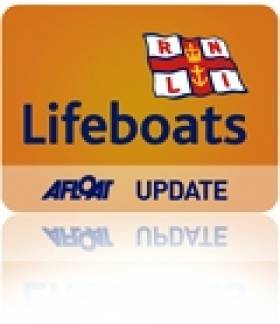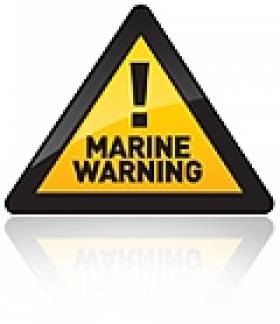Displaying items by tag: lake
#warmlkake – A lake in county Mayo is among a number of lakes around the world that are 'warming' and Irish Marine Scientists are part of a global research project examining the trend.
Data for Lough Feeagh, situated in the Burrishoole catchment in Co. Mayo, forms part of the data, and is one of a small number of lakes worldwide for which long-term temperature data are available.
A temperature recorder on Lough Feeagh was originally installed in 1960, when the Salmon Research Trust of Ireland began investigations into the movement of salmon, trout and eel through the catchment.
The magnitude and uniformity of the worldwide trend remains unclear but to facilitate research on this topic, a global database of summer temperatures for 291 lakes from 1859-2009 has been compiled, complemented by data on local climatic drivers and lake geomorphology.
The paper describing lakes as sentinels of climate change is published in the Journal of Scientific Data, by Nature (http://www.nature.com/sdata/) on the 17th March 2015. Dr Elvira de Eyto, Marine Institute and co author on the paper along with Marine Institute scientists are part of the Global Lake Temperature Collaboration (GLTC), an international group assembled to provide increased access to global lake temperature records.
The GLTC project recognised that a new global database of lake surface temperatures was needed, including not only satellite data, but also "on the ground" measurements from in situ data collection programs. Since its
inception in 2010, the GLTC initiative has grown to a database of 291 lakes and reservoirs worldwide, providing summer-mean lake surface temperatures from 1985-2009, and roughly doubling the amount of data previously available from satellites alone. This new dataset represents the first publicly available global compilation of in situ and satellite-based lake surface temperature data. The GLTC database also provides information on climatic drivers (air temperature, solar radiation, cloud cover), as well as geomorphometric characteristics that may affect lake temperature (latitude, longitude, elevation, lake surface area, maximum depth, mean depth, volume).
This unique, global dataset will offer an invaluable baseline perspective on lake thermal conditions for ongoing and future studies of environmental change. The Marine Institute continues this work, and maintains an extensive environmental monitoring programme in the catchment which is used to record climate and land use changes that may impact fish stocks.
Lough Derg Lifeboat Rescue Yacht Aground
At 18.37 the lifeboat launched with helm Colin Knight, Eleanor Hooker and Ger Egan on board. The lake was calm and with good visibility from the moonlight when night fell. The lifeboat came alongside the casualty vessel at 19.05hrs and found that the person on board was safe and unharmed. The lifeboat took soundings in and around the entrance to the private harbour and having decided that there was not sufficient depth for the draft of the vessel, took the vessel off the sandbar and then towed her to the safety of the public harbour of Kilgarvin Quay a short distance away.
The skipper of the vessel thanked the crew of the lifeboat. He said that he was 'very glad you came out, I was preparing myself to sit here all night'.
The lifeboat returned to station and was ready for service again at 20.50hrs
Related Safety posts
RNLI Lifeboats in Ireland
Safety News
Rescue News from RNLI Lifeboats in Ireland
Coast Guard News from Ireland
Water Safety News from Ireland
Marine Casualty Investigation Board News
Marine Warnings
Stay Away from the Edge Warns Irish Water Safety
Irish Water Safety is asking people to keep away from the water's edge during the current violent storm force winds and high seas. Ireland averages 153 drownings every year and every year a number of tragedies occur as a result of people walking too close to the edge of coastal areas, cliffs, rivers and lakes during such stormy conditions.
Irish Water Safety is also asking those who own a small craft to make sure that it is well secured and when doing so, to wear a lifejacket at all times as there have been drownings during such activities in the past.
Motorists need to be particularly vigilant to avoid flooded areas on roads but particularly near rivers, because with poor light and short days it is not possible to determine the depth of floods easily. Swift water will carry cars and other vehicles away and there have been very tragic drownings in the past as a result of such accidents.
Children are naturally curious about water, therefore parents should caution them that floodwater hides the true depth and that manhole covers may be open and that small streams when swollen are very fast and deeper than normal.
What should I do when I hear a Flood Warning?
· Listen to the national and local radio for met eireann updates and AA Road watch updates
· Check on neighbours particularly if they are elderly, infirmed or families with young children
· Move your vehicles to higher ground
· Move animal stock to higher ground
· Check your small craft to ensure they are well secured or moored
· Make sure you have warm clothes, food, drink, a torch and radio.
· Block doorways and airbricks with sandbags or plastic bags filled with earth. Floodgate products will work effectively also.
· Switch off gas and electricity supplies if flooding is imminent.
· Check the time of High Water in the Newspaper.
· Check out www.flooding.ie for more detail on General flooding
Personal Safety
· Avoid flood waters at all times
· carry a mobile phone at all times in case you need to call for help - call 112 or 999 in emergency
· Wear suitable protective clothing & a lifejacket in on or around water
· Do not enter fast flowing water.
· Never put your feet down if swept away by fast flowing waters
· Flooding on roads will be deeper at dips and around bridges.
· Stay away from sea and flood defences.
· when walking or driving, be aware of manhole covers and gratings that may have been moved due to the heavy flow of water.
· Take care when using electric appliances in damp or flood conditions.
· Remember that during the hours of darkness the dangers are multiplied.
After the flood
· Avoid eating food that has been in contact with flood water.
· Run water for a few minutes and wash your taps.
· Check gas and electricity supply.
· Leave wet electrical equipment alone to dry and have it checked prior to use.
· Ventilate your property well.
· Check on elderly neighbours.































































